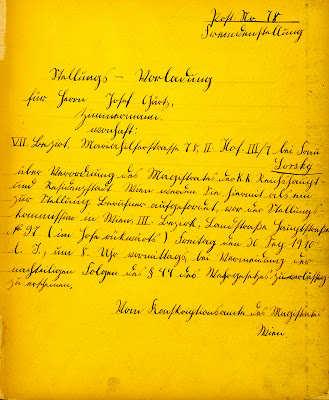 This is a repost that first appeared in November, 2010.
This is a repost that first appeared in November, 2010.
The summer before Josef wrote his sweet postcard to Lisi (see Can Love Last 100 Years?), he had received a written notice not nearly as delightful.
A scan is at the left. It was the first page in a notebook onto the front of which my grandfather had handwritten his name, Josef Gärtz. I had first looked at it closely about four years ago, but the script was impossible.
Must be a diary, I thought, as I carefully turned yellowing pages, still in pretty good shape almost a century later. What secrets might it hold?
I asked a friend raised in Germany to take a stab at deciphering the old script.
Here’s a translation of what’s on the first page:
Nr. 78
Foreign Draft/service?
Draft Summons
For Mr. Josef Gärtz
Carpenter
Dwelling:
Bezirk [district] Mariahilferstrasse (the street) 78,
II. Hof. III/7 bei Frau Sorsky
(probably the 3rd floor—which would be like our 4th; room #7. “bei” means he’s living in the home of Frau Sorsky.)
By order of the magistrate of the K.K. [Kaiserlich/Königlich—the Kaiser and King], capital and residence city, Vienna, you are summoned to appear promptly [“reliably”] before the draft commission in Vienna, 3rd District, Landstreet/Mainstreet Number 97 (in the back of the courtyard) on Friday, the 30th of September, 1910 L.J. [Laufendes Jahres, means “this year”] at 8 O’Clock in the morning to avoid the consequences of rule ¶44 of the Military Law.
From the Conscription Office of the Magistrate, Vienna
I’m not sure what rule ¶44 of the Military Law is, but I can imagine the “consequences” for breaking it weren’t pleasant.
It appears that this conscription notice was sent in a notebook, perhaps to later contain his military record. But Josef used the next 57 pages for his own writing, most of which seemed to comprise folk songs and amusing stories, some rather off-color, according to my German friend.
If anyone has any other information about the manner of sending draft notices in notebooks at that time, please comment.
Josef was twenty-one. He was in love. Transylvania was part of the Austro-Hungarian Empire. No democracy, of course. It was “Kaiser and King” that commanded him.
By 1910, the year of Josef’s draft notice, 70% of American immigrants came from southern and eastern Europe, the latter where Transylvania lay. Imagine the visions inspired by that faraway land, firing the dreams of so many millions.
In the context of the time, what thoughts ran through Josef’s head when he received this notice? What were his options? What were the risks of each?
I love that you are reposting. I did not start following your blog at the beginning and missed several. I know, I know, I could always go back and read what I missed. Often, I did, but I still missed many and this was one of them.
Hey Margel,
So glad you see you here and that you’re enjoying these early posts. Yes, they really do set the stage for the immigrant story to come and include some the oldest and most exciting finds — as we had no idea my grandparents had maintained diaries and correspondence with which we now can recreate their young lives (and love)